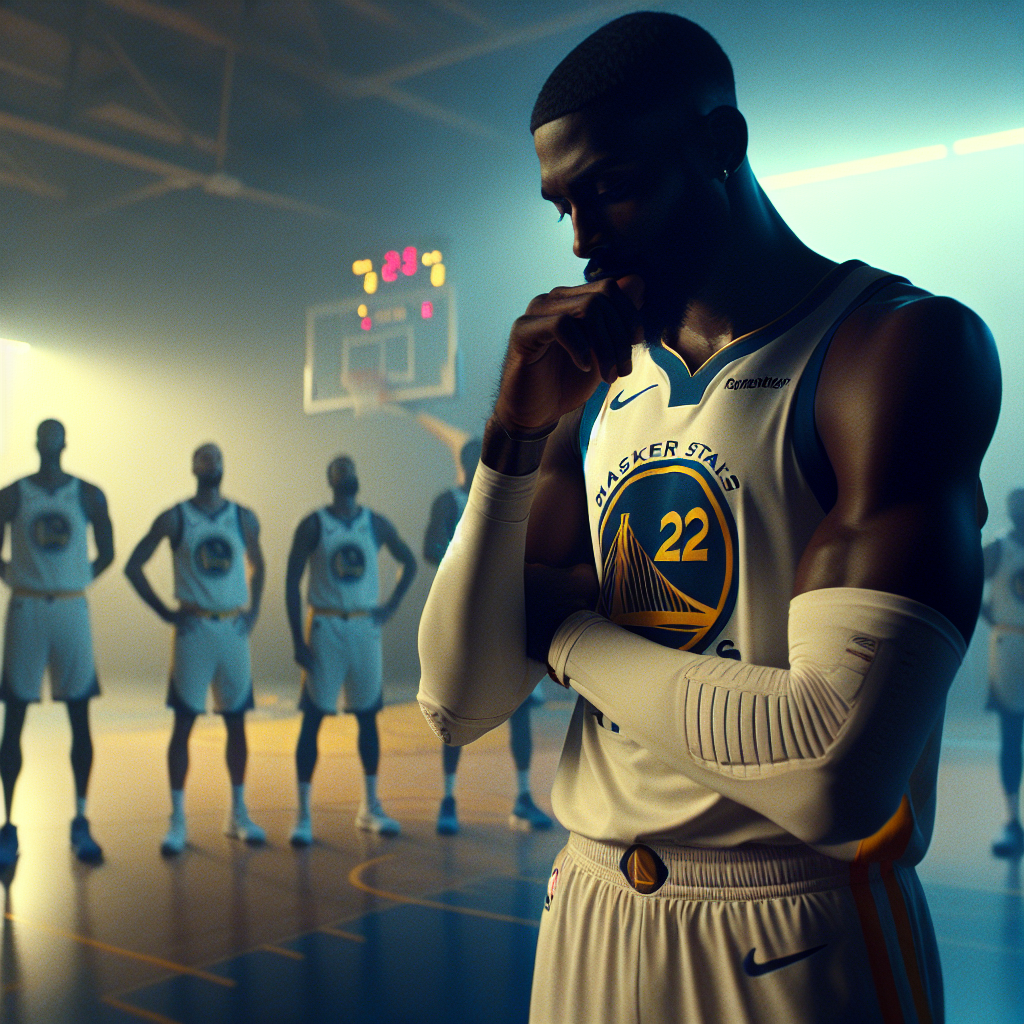Kevin Garnett thinks Warriors shy away from serious talks with Draymond Green

Kevin Garnett’s Perspective: Warriors’ Reluctance in Draymond Green Negotiations
Kevin Garnett, a former NBA star known for his candid opinions, recently shared his perspective on the Golden State Warriors’ approach to contract negotiations with Draymond Green. Garnett, who has always been vocal about player rights and team dynamics, believes that the Warriors are hesitant to engage in serious discussions with Green regarding his future with the team. This reluctance, according to Garnett, stems from a combination of financial considerations and the complex nature of Green’s role within the team.
Draymond Green, a pivotal figure in the Warriors’ recent successes, has been instrumental in their championship runs. His defensive prowess, playmaking abilities, and leadership on and off the court have made him an indispensable part of the team. However, as Green approaches the latter stages of his career, the Warriors are faced with the challenging task of balancing their financial commitments while maintaining a competitive roster. Garnett suggests that this financial balancing act is a significant factor in the Warriors’ cautious approach to Green’s contract negotiations.
Moreover, Garnett points out that Green’s unique skill set and fiery personality add another layer of complexity to the negotiations. Unlike traditional players who can be easily replaced, Green’s contributions go beyond the stat sheet. His ability to anchor the defense, facilitate the offense, and provide emotional energy is not something that can be easily quantified or replicated. This makes the decision to extend his contract a multifaceted one, requiring careful consideration of both his on-court impact and his influence in the locker room.
Transitioning to the broader context of the NBA, Garnett’s observations highlight a common dilemma faced by many teams: the challenge of managing aging stars while planning for the future. As players age, their performance may decline, but their experience and leadership remain invaluable. Teams must weigh the benefits of retaining veteran players against the potential risks of long-term financial commitments. In Green’s case, his recent performances have shown that he still has much to offer, but the Warriors must also consider their long-term strategy and salary cap implications.
Furthermore, Garnett emphasizes that the Warriors’ reluctance to engage in serious talks with Green could have repercussions beyond the immediate contract negotiations. It could impact team morale and the overall dynamics within the organization. Players often look to how teams treat their veterans as a measure of the organization’s loyalty and commitment. A perceived lack of respect or appreciation for Green’s contributions could send a negative message to the rest of the team and potential future free agents.
In conclusion, Kevin Garnett’s perspective sheds light on the intricate and often delicate nature of contract negotiations in the NBA. The Warriors’ cautious approach to Draymond Green’s future reflects broader challenges faced by teams in managing aging stars while planning for sustained success. As the Warriors navigate these negotiations, they must balance financial prudence with the need to honor and retain a player who has been central to their achievements. Garnett’s insights remind us that beyond the numbers and contracts, the human element of respect, loyalty, and recognition plays a crucial role in the world of professional sports.
Analyzing Kevin Garnett’s Take on Warriors’ Approach to Draymond Green

Kevin Garnett, a former NBA star known for his candid opinions, recently shared his thoughts on the Golden State Warriors’ handling of Draymond Green. Garnett suggested that the Warriors might be avoiding serious discussions with Green, a key player in their lineup. This perspective raises several questions about the dynamics within the team and the potential implications for their future.
Draymond Green has been an integral part of the Warriors’ success over the past decade. His defensive prowess, playmaking abilities, and leadership on the court have contributed significantly to the team’s multiple championships. However, Green’s outspoken nature and sometimes volatile behavior have also been points of contention. Garnett’s assertion that the Warriors are shying away from serious talks with Green could indicate underlying tensions that are not immediately visible to the public.
One possible reason for the Warriors’ hesitance to engage in deep conversations with Green could be his strong personality. Green is known for his passionate and sometimes confrontational approach, which can be both a strength and a challenge. The Warriors’ management might be wary of triggering conflicts that could disrupt team harmony. By avoiding serious talks, they might be attempting to maintain a delicate balance within the team.
Moreover, the Warriors’ current roster dynamics could also play a role in this situation. With the emergence of younger talents and the need to integrate new players, the team might be focusing on broader strategic goals rather than individual issues. In this context, addressing Green’s concerns or demands might not be a priority, especially if it risks creating friction within the squad.
Another factor to consider is the financial aspect. Green’s contract and future with the Warriors are likely topics of significant importance. Engaging in serious talks about his role and compensation could have substantial financial implications for the team. The Warriors might be weighing their options carefully, considering the long-term impact on their salary cap and overall team structure.
Transitioning to the potential consequences of this approach, it is essential to recognize that avoiding serious discussions with a key player like Green could have repercussions. Green’s value to the team extends beyond his on-court performance; his leadership and experience are invaluable assets. If he feels undervalued or sidelined, it could affect his motivation and performance, ultimately impacting the team’s success.
Furthermore, the Warriors’ approach to Green could set a precedent for how they handle other players in the future. If the team is perceived as avoiding difficult conversations, it might affect their reputation and relationships with current and prospective players. Maintaining open and honest communication is crucial for building trust and fostering a positive team culture.
In conclusion, Kevin Garnett’s observation about the Warriors’ reluctance to engage in serious talks with Draymond Green sheds light on the complexities of managing a high-profile team. While there may be valid reasons for the Warriors’ approach, it is essential to consider the potential implications for team dynamics, financial planning, and overall success. Balancing the need for strategic decision-making with the importance of addressing individual concerns is a delicate task that requires careful consideration. As the Warriors navigate these challenges, their ability to maintain harmony and cohesion within the team will be crucial for their continued success.
Kevin Garnett Questions Warriors’ Commitment to Draymond Green Talks
Kevin Garnett, a former NBA star known for his candid opinions, recently expressed his skepticism regarding the Golden State Warriors’ commitment to engaging in serious contract discussions with Draymond Green. Garnett’s comments have sparked a conversation about the Warriors’ long-term strategy and their approach to maintaining the core of their championship-winning team. As a key player in the Warriors’ success, Green’s future with the team is a matter of significant interest to fans and analysts alike.
Garnett’s observations come at a time when the Warriors are navigating the complexities of managing their roster while staying competitive in a rapidly evolving league. Draymond Green, known for his defensive prowess, playmaking abilities, and leadership on and off the court, has been instrumental in the Warriors’ multiple championship runs. However, as Green approaches the latter stages of his career, questions about his value and the team’s willingness to invest in him long-term have become more pronounced.
In his remarks, Garnett suggested that the Warriors might be hesitant to fully commit to Green due to concerns about his age, potential decline in performance, and the financial implications of a new contract. This perspective is not without merit, as the NBA is a business where teams must balance loyalty to their players with the practicalities of salary cap management and future planning. Nevertheless, Garnett’s comments also highlight the delicate nature of player-team relationships and the importance of clear communication and mutual respect.
Transitioning to the broader context, the Warriors’ situation with Green is emblematic of a larger trend in professional sports, where teams must constantly evaluate the trade-offs between retaining veteran players and developing younger talent. The Warriors have already made significant investments in their roster, including lucrative contracts for Stephen Curry and Klay Thompson. Adding another substantial contract for Green could limit their flexibility in pursuing other opportunities to strengthen the team.
Moreover, Garnett’s insights raise questions about the Warriors’ overall strategy and whether they are prioritizing short-term success over long-term sustainability. While Green’s contributions to the team are undeniable, the Warriors must also consider how to remain competitive in the future. This involves making difficult decisions about which players to retain and how to allocate resources effectively.
In light of Garnett’s comments, it is essential to consider the perspectives of both the Warriors’ management and Draymond Green himself. From the team’s standpoint, ensuring that they have a balanced and competitive roster is paramount. This may involve making tough choices about player contracts and exploring all available options. On the other hand, Green, as a player who has given his all to the team, understandably seeks recognition and security for his contributions.
Ultimately, the resolution of this situation will depend on the ability of both parties to find common ground and reach an agreement that aligns with their respective goals. Whether through a new contract or other arrangements, the Warriors and Green must navigate this complex landscape with transparency and mutual understanding.
In conclusion, Kevin Garnett’s remarks about the Warriors’ approach to Draymond Green’s contract discussions have brought to light important considerations about team dynamics, player value, and long-term planning in professional sports. As the Warriors continue to strive for excellence, how they handle Green’s situation will be a critical factor in shaping their future success.

